Not far off the Pacific coast highway lies a scenic viewpoint unlike any other in Costa Rica. El Penon de Guacalillo is a dramatic rocky cliff that rises about 40 feet (12 meters) from the sand. To add to the drama, powerful waves crash into the steep ledge at higher tides. In this post, we’ll you know what to expect when visiting El Penon de Guacalillo. We’ll also tell you about some more rock formations and caves just north that can be explored.
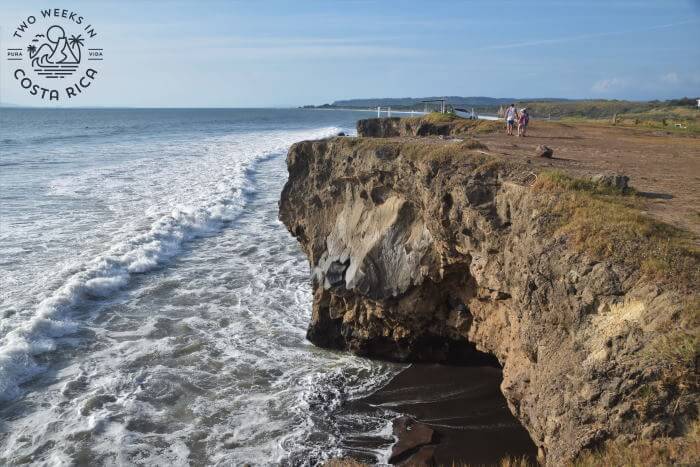
Location
El Penon de Guacalillo is located on the central Pacific coast, north of Tarcoles and south of the city of Puntarenas. The rock formation is considered part of Playa Guacalillo. The tiny town of Bajamar and Playa Bajamar is just north.
Although this area is only about 25 minutes off the highway, it has a remote, campo (country) feel. From Highway 34, you’ll pass through villages with modest homes, pulperias (small grocery stores), and small schools and churches.
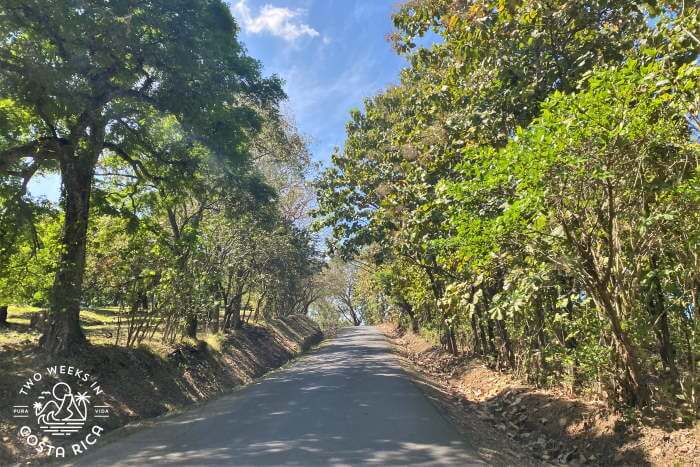
El Penon de Guacalillo can be easily visited from the Jaco area. It also makes a nice stop on the way to the central or southern Pacific coast (e.g., Manuel Antonio, Dominical, Uvita, Osa Peninsula).
See directions below.
About El Penon de Guacalillo
Arriving
Right before you get to Playa Guacalillo, you’ll see a small guard house on a hill to the right. This is where you will enter and pay the 3,000 colones (about $5) admission. This fee is per car. It lets you park there and use the basic amenities (bathhouse, showers, and pergolas).
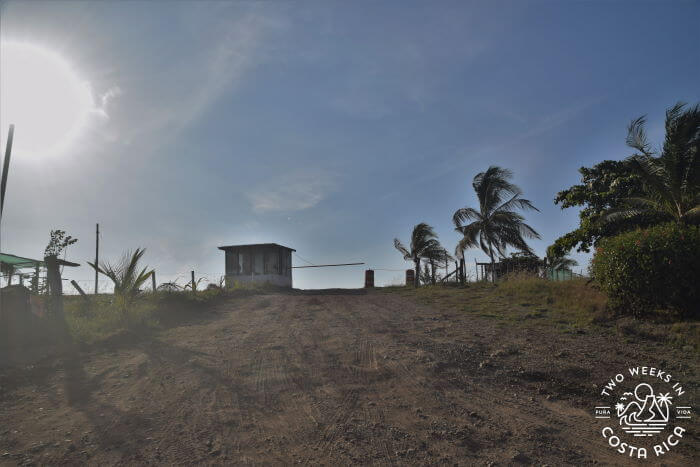
You can park anywhere along the top of the cliff.
As soon as you step out of your car, you’ll see the impressive cliffs cascading below.
The Cliffs
These grand cliffs formed from ancient volcanic eruptions. As Costa Rica is in the Ring of Fire, much of the beaches have volcanic sand, but it’s unusual to see tall rock formations along the coast like at El Penon.
The cliffs are in sections. You can walk along the edge to a few points to see different angles. Be sure to bring your camera for some amazing captures.
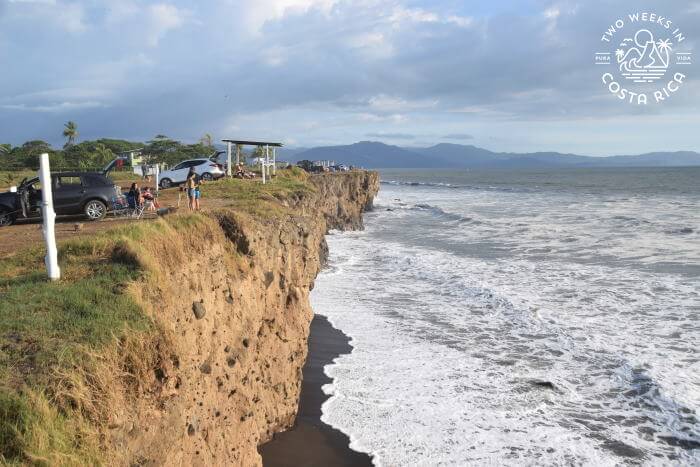
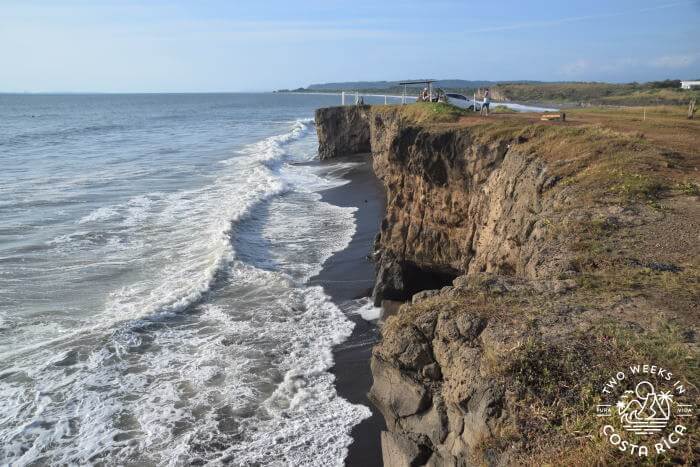
Keep in mind that there are no guardrails or fences at all for safety. We had our two young children with us, and it was a bit nerve-racking to say the least. It is a big drop!
Sunset
El Penon de Guacalillo is a popular spot for sunset among locals. If you want to catch sunset, plan to arrive early. Sunset in Costa Rica is around 5:30 p.m. year-round.
Walking Down to the Beach
If you walk north along the cliff, on the inland side, there is a path that takes you down to the beach. Even at mid-tide, we were able to access it without having to get wet.
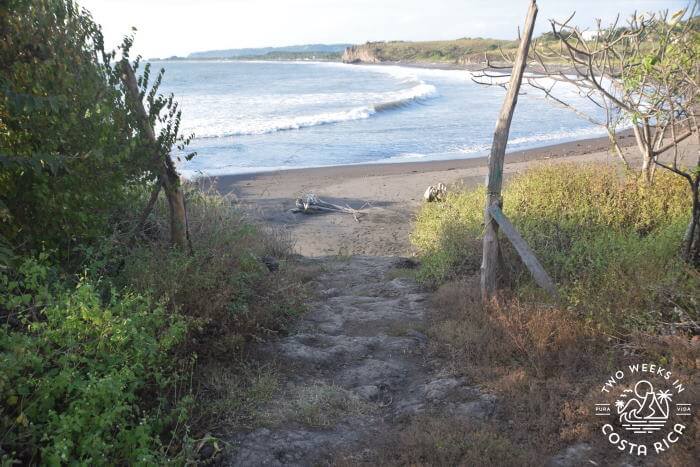
From here, you can see Playa Bajamar to the north and a lagoon backing it. Always be on the lookout for crocodiles at lagoons like this in Costa Rica.
People also access the bottom of the cliffs from right outside the entrance to the parking area. This beach area is just south of the cliffs and is completely public and free to visit. At low tides, you can walk below the cliffs along the sand.
Other than taking in the view of the cliffs and ocean, there isn’t much to do at El Penon de Guacalillo. Luckily, we found some other interesting sights not far away.
Punta del Pacifico, Tivives Cliff, and Penon de Bajamar
Another Place to Visit
If you drive a few kilometers north of El Penon de Guacalillo, you’ll come to another rocky point. This spot has some caves to see. Accessing this area is free. It is separate from El Penon de Guacalillo.
To get here, you’ll take the beach road that runs along Playa Bajamar. Near the point, the road will become very narrow (only wide enough for one car) with some big ruts. You’ll have to go slow and it’s best to have a higher clearance vehicle. If you’re coming in rainy season (May to end of November), opt for a four-wheel drive.
During the rainiest times of year, large puddles may prevent you from accessing these sections.
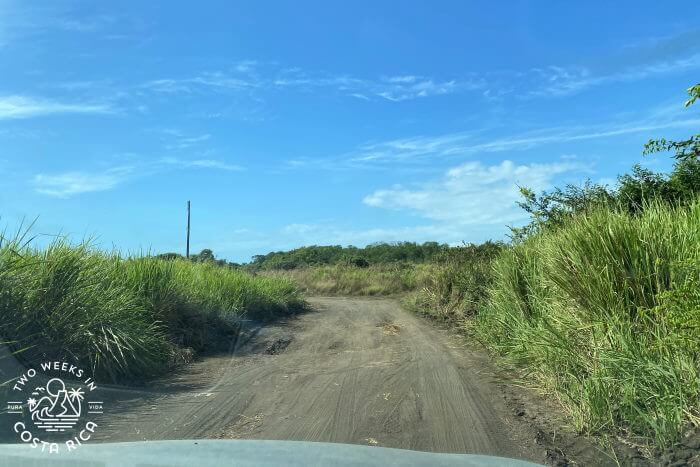
Cliffs and Caves of Punta del Pacifico, Tivives, and Penon de Bajamar
Once you get to the end of the road, you can park and explore the rocky cliffs. These ones are smaller, around 15 feet (4.5 meters) tall, but still really interesting.
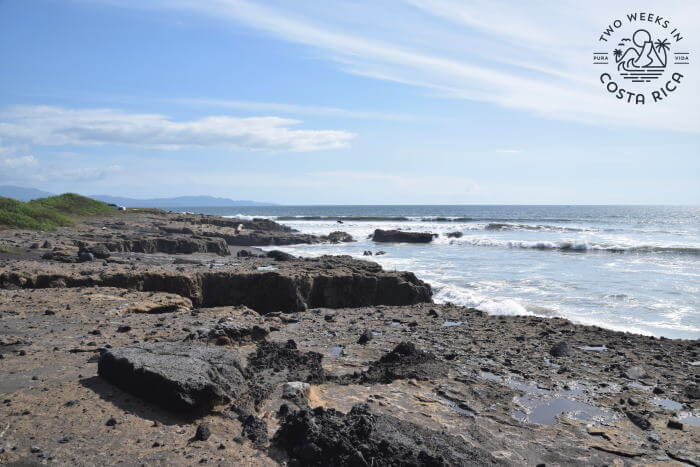
The rock is composed of different types of magma, with varying colors and random smaller rocks incorporated throughout. If you have an interest in geology, you will be fascinated.
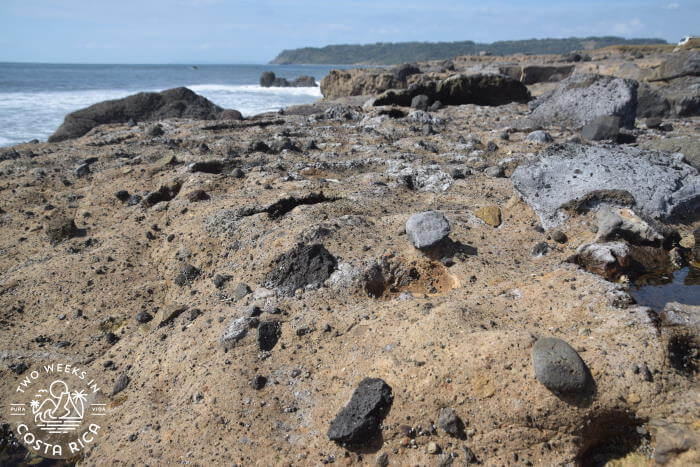
At lower tides, you also can walk down to see some of the caves that have formed. Our kids enjoyed this. Just be careful as the ocean does come crashing through when the tide is coming in.
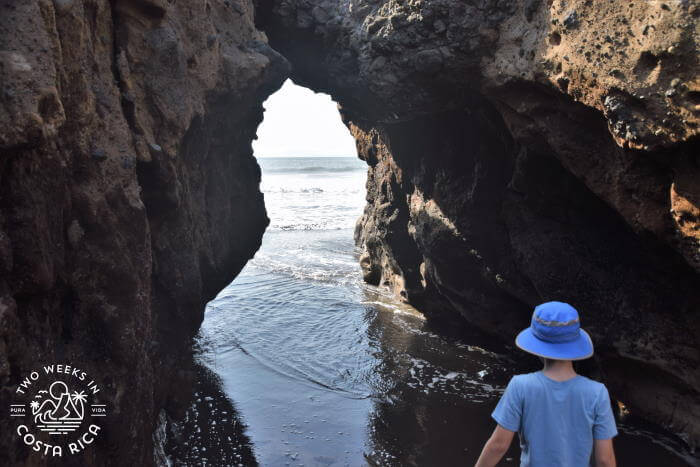
If you go to the northern end of Punta del Pacifico, you can walk down to the beach where it meets the Jesus Maria River. Across to the right is Penon de Bajamar, which is another tall cliff with a big cave below. The river divides the two beaches (Tivives Beach is on the other side) so you can’t access Penon de Bajamar from the point, but you can still see it.
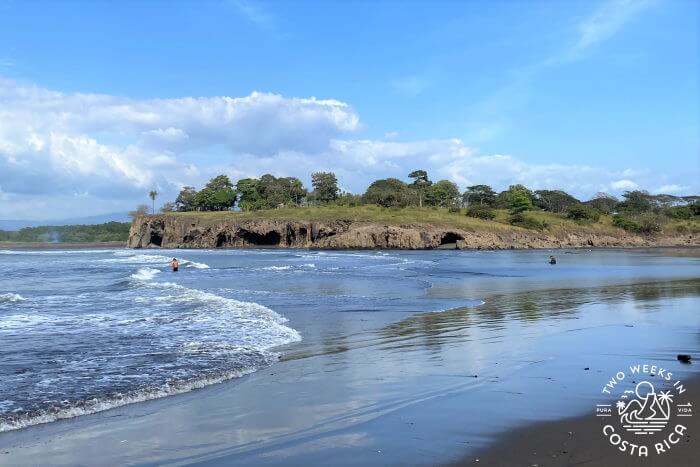
Unfortunately, on our visit, this beach had a lot of trash. We also have heard that the water quality isn’t good so we don’t recommend swimming.
Tips for Visiting El Penon de Guacalillo
Directions
From Highway 34, you’ll take the turn towards the ocean for the town of Lagunillas. Look for a big liquor store and market called Super y Licorera El Sol Naciente.
Follow the road towards the beach. It will be paved until Escuela Cuarros de Tarcoles (about halfway). At the school, the road turns to dirt but is in good condition (fine with a regular sedan).
When you get closer to the beach, you’ll come to an intersection with several signs. Keep left.
Once you arrive at Playa Guacalillo, the entrance/guard house will be on the right. It’s up a somewhat steep hill. There is a sign. In rainy season, if you don’t have 4×4, you may need to leave your car parked below on the main road.
Here is a map with drections from Jaco.
If you plan to visit the other cliffs and caves at Punta del Pacifico, Tivives Cliff, and Penon de Bajamar, it’s best to have an SUV for clearance (4×4 recommended during rainy season due to mud).
Admission
The cost to enter the gated area of El Penon de Guacalillo is 3,000 colones (about $5) per vehicle
Hours
El Penon de Guacalillo is open 7:00 a.m. to 7:00 p.m. every day
Amenities
El Penon de Guacalillo has a basic bathroom and showers. There are a few simple pergolas for shade.
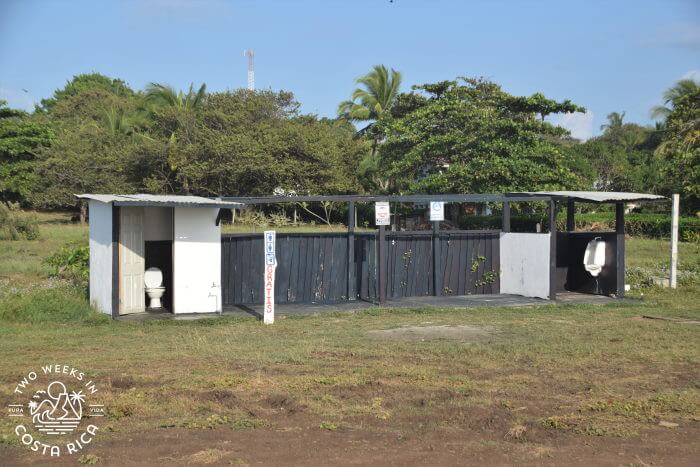
An outdoor vendor sells drinks nearby. There is no grocery store in the immediate area so bring what you’ll need for the day.
What to Wear/Bring
There are no trees for shade anywhere along the beaches near El Penon so be sure to have a hat and sunscreen. It’s usually windy so a baseball cap or something with a strap is best.
This area also can get really hot, especially in dry season, so bring plenty of water.
You have to do a bit of walking to see everything, so we’d recommend hiking sandals like Keens, especially for kids.
Restaurants
If you’re looking for a restaurant, there are only a couple of options around.
We enjoyed Donde Vin on Playa Bajamar. Donde Vin is a casual spot owned by locals that serves traditional Costa Rican food. They have tables right on the sand.
Conclusion
El Penon de Guacalillo and the nearby cliffs and caves are a worthwhile stop. Even if you only have an extra hour, you can get some amazing photos of El Penon. And if you have extra time, it’s fun to check out the smaller cliffs and caves to the north.
Have a question about visiting El Penon de Guacalillo? Leave a comment below.
Looking for more information to plan your trip to Costa Rica? Check out these posts:
Jaco: Costa Rica’s Booming Beach Town – Learn about one of the biggest destinations on the central Pacific coast. Our recommendations for hotels, activities, restaurants, and more.
Tarcoles River Bridge: This is another fun stop on the way to Manuel Antonio and points south. You can see giant crocodiles right from this bridge.
Costa Rica Rental Car Discount: To explore remote places like El Penon, it’s best to have your own vehicle. Check out our discount through a reputable company in Costa Rica to save 10% and get free extras.
